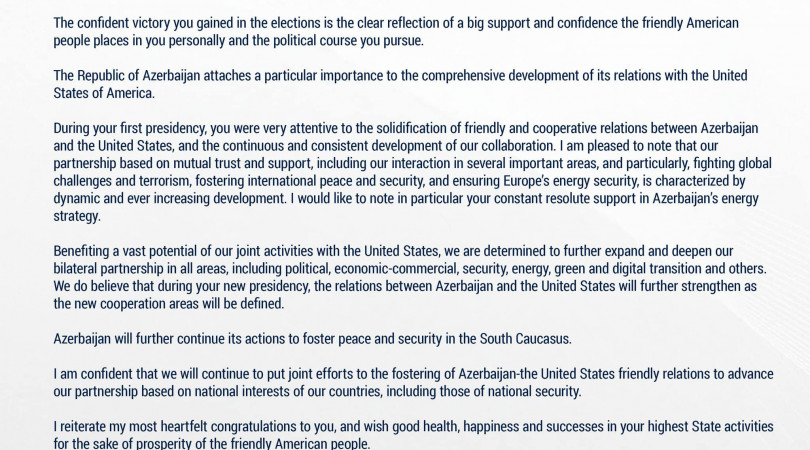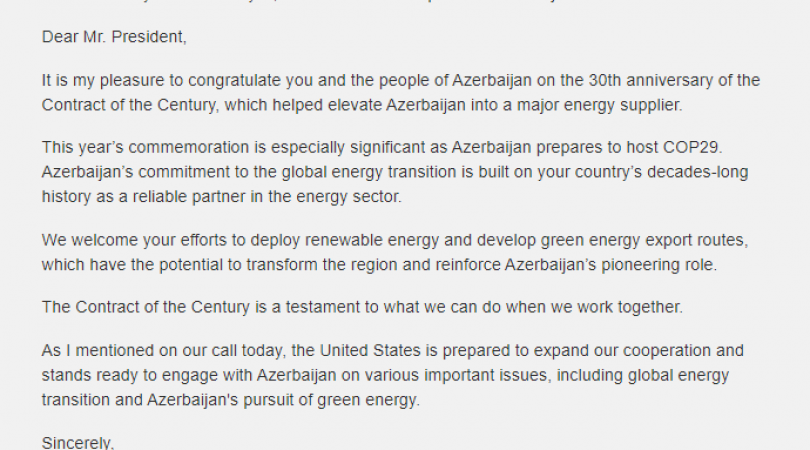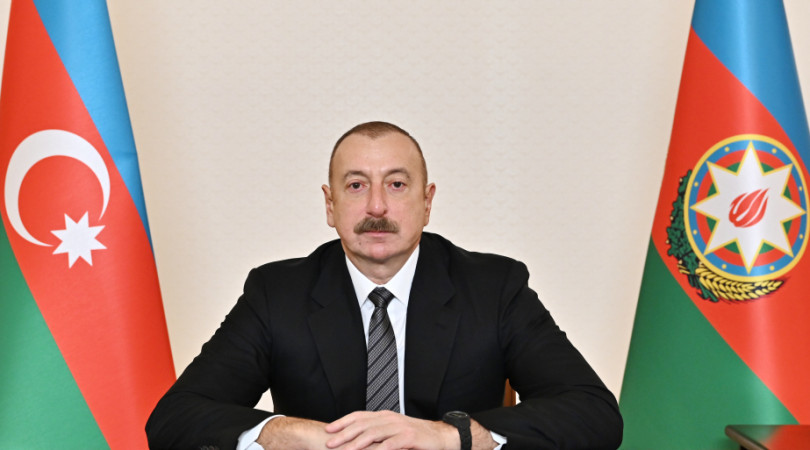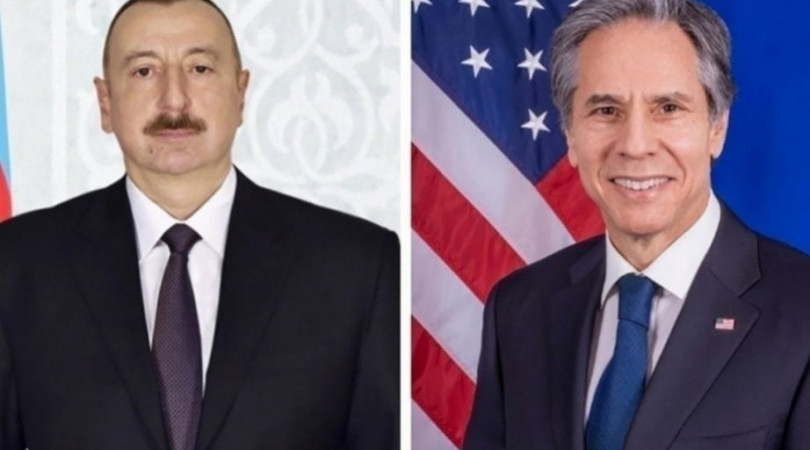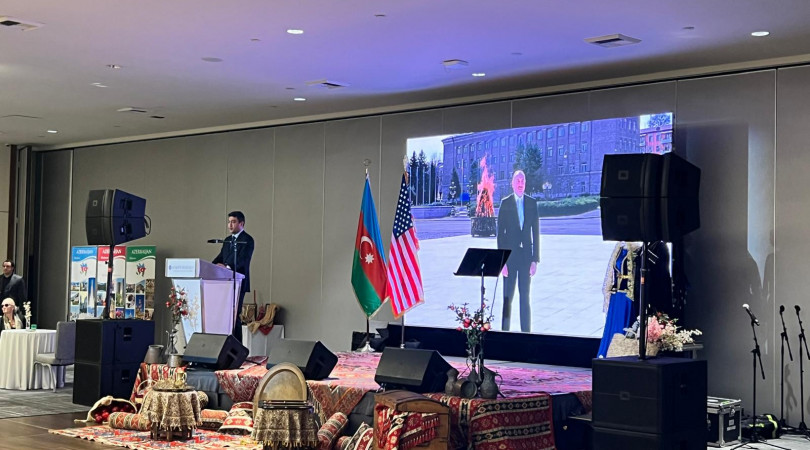Ilham Aliyev received newly appointed UN Resident Coordinator in Azerbaijan
President of the Republic of Azerbaijan Ilham Aliyev has received newly appointed United Nations Resident Coordinator in Azerbaijan Vladanka Andreeva.
UN Resident Coordinator in Azerbaijan Vladanka Andreeva presented a letter of her appointment to President Ilham Aliyev and said:
- I am pleased to present to you a letter on my appointment as UN Resident Coordinator in the Republic of Azerbaijan. It is an honor for me to be here and lead the UN system to support Azerbaijan in developing and achieving the Sustainable Development Goals.
President Ilham Aliyev said:
- Welcome. I’m very glad to see you. I wish you a pleasant stay in Azerbaijan. As you know, Azerbaijan has always been a very active member of the United Nations. We have even been elected as a non-permanent member of the UN Security Council some ten years ago with the extensive support of the international community. One hundred fifty-five countries supported our candidacy, and that was a demonstration of the international reputation of the country and active foreign policy. During the two years of our chairmanship, we initiated important issues and addressed important global issues which were on the agenda of the international community. Of course, now, as a chair of the Non-Aligned Movement, which is the largest after the United Nations international institution, we play an important role in international affairs and support the United Nations Secretary-General’s initiatives, especially on fighting COVID. As you know, we, as a chair of the NAM, initiated a special session of the United Nations General Assembly devoted to coronavirus at the end of the last year, and that was also our contribution to the global fight against this disease. Also, in the national capacity, we provided assistance to more than 30 countries, financial and humanitarian, and also shared the vaccines with the countries which needed then our support. So, this demonstrates our agenda as a responsible member of the international community.
Within our capacity and our potential, we try to contribute to the cause of peace and security. With the United Nations, our active interaction with institutions started as a result of Armenian aggression, and 1993 was a year when those famous resolutions of the Security Council were adopted, which were a very positive step, an encouraging gesture of support, and addressing the Armenian aggression. The demand for immediate, full, unconditional withdrawal of Armenian troops from our internationally recognized territories was a significant political gesture of the Security Council. But unfortunately, these resolutions were not implemented, and as you probably know, many times I personally raised this issue that there is no mechanism of implementation of the Security Council resolutions. In one case, they were implemented for a short period of time, but in our case, they were not implemented at all by international players. Especially what was of concern and was difficult to understand by Azerbaijani society that those who adopted those resolutions, three out of five permanent member-states, were the countries which were and still are the co-chairs of the OSCE Minsk Group. So, they themselves adopted those resolutions, and they had a mandate to facilitate the implementation of these resolutions. But unfortunately, 28 years of the Minsk Group were the years of lost opportunities. On many occasions, I raised the issue of imposing sanctions on Armenia. Because I thought that could be a way how to avoid confrontation, avoid war. We wanted to resolve this issue peacefully. Speaking last year at the General Assembly just several days before the war, I was warning the international community that Armenia is preparing for war, that these were not just words for the sake of propaganda. That was a realistic analysis of Armenia’s behavior in the months prior to the war. And unfortunately, I was right. If sanctions were imposed on Armenia on time, if Minsk Group co-chairs - three leading countries of the world used five percent of their potential to persuade or to force Armenia to withdraw its occupational forces, then the war would not have happened. Therefore, the responsibility for the war does not only lie on Armenia but on those who could not or did not want to force them to comply with international law. Therefore, Azerbaijan implemented these resolutions itself within international law norms. We restored justice; we restored international law norms. We implemented the United Nations Security Council resolutions ourselves, and we acted in accordance with UN Charter. Chapter 51 recognizes the right for every country for self-defense. So, we used all the existing international instruments to restore our territorial integrity.
So now the war is over, the conflict is resolved, there is nothing to talk about what happened. We need to look to the future, and of course, our main concern now is a restoration of destroyed territories which are in full devastation. Of course, we count on future cooperation with the United Nations on these issues, issues related to the humanitarian situations, issues related to our plans with the restoration of the liberated territories. Of course, we will need more interaction with UN institutions. As you probably know, we also are in contact with UNESCO, and we have been waiting for UNESCO for almost 30 years. I don’t know whether you know it or not, a couple of years ago, last time when we invited UNESCO to come, that was, of course, the time of occupation, to come and see what has been done to our territories. Because the OSCE Minsk Group twice sent a fact-finding mission to the occupied territories. We have been asking them to send another mission, but they did not. We’ve been asking UNESCO to come and see the damage to our historical monuments caused by Armenian aggressors, and they refused. UNESCO officials were saying that UNESCO is not involved in political issues. But after the war was over, we received signals from UNESCO that they want to come. Of course, we expressed our surprise because they were not coming for almost 30 years when we have been asking them. They decided to come after the war. Therefore, we, of course, agreed to that, and as far as I know, the last information was that their mission has already been created, but now Armenia is objecting again. Therefore, it’s again delayed.
With other UN institutions also we are in permanent contact. We will need a broad international involvement and assistance from the point of view of experts, point of view of advisors because the area which we are now restoring is more than ten thousand square kilometers. And of course, we are in touch with the UN High Commissioner for Refugees’ office, and we are planning to resettle the former refugees as soon as possible. Still, the main problem is landmines and total devastation on the occupied territories. So, we will work with the United Nations and its institutions in a good phase as good partners in order to achieve our primary goal of restoration of liberated territories. We count on the very active involvement of your office in Baku.
X X X
UN Resident Coordinator Vladanka Andreeva said:
-Thank you, Mr. President. The friendship between the UN and Azerbaijan is 29 years old. Next year, we will celebrate the 30th anniversary of Azerbaijan's membership in the UN. At the same time, we will mark the 30th anniversary of the opening of the UN Office in Baku. There are many dates to be celebrated and reviewed, and I believe the last 18 months have seen unprecedented events. COVID-19 has become a global crisis, and many countries have struggled with it. I would like to praise the efforts you and your government have put in place to take a decisive national response to COVID-19. However, you also noted that during this period, we had to demonstrate a stronger commitment to multilateralism and shared responsibility. We are grateful for your efforts – first of all, to hold the Non-Aligned Movement Summit to discuss the response to COVID-19 and then to organize a special session of the UN General Assembly.
When it comes to vaccination in Azerbaijan, your country is in one of the most promising positions in the region. The United Nations remains committed to the work it has done in the past 18 months and providing assistance. We have distributed about 4 million first aid kits. We have invested in joint training of government and healthcare workers. More than 3,000 employees have been trained. The public campaign to prevent COVID-19 has reached more than 1 million people. As you mentioned, this has not been the only challenge facing the Azerbaijani people over the past 18 months. We do hope that the trilateral declaration signed on 10 November will give an impetus to the establishment of lasting peace in the South Caucasus and usher in a new era leading to peace and cooperation. The UN supported the government in assessing the needs of the Karabakh region in December. We immediately raised $1 million to help ANAMA clear mines in six districts along the previous line of contact. We will continue to support national specialists in mine clearance because we understand that this is a priority. At the same time, the UN is working with the World Bank, the European Union and other international partners to establish a fund to coordinate training for ANAMA and ensure that the demining process is carried out in accordance with the highest standards. We remain committed to supporting efforts to ensure the safe and dignified return of IDPs to the region. Taking a step forward, on 1 March, we signed a new Framework Document on Cooperation between the UN and Azerbaijan, a new pact. We have set ambitious goals for the next five years. In fact, we want to support inclusive growth and work with young people to develop their skills in the labor market. We would also like to support the government's initiatives to build a greener economy and strengthen the capacity of institutions in the areas of healthcare, social protection, education and justice. In addition, we would like to support the government's efforts to empower women and girls in all spheres of life.
Source: president.az

